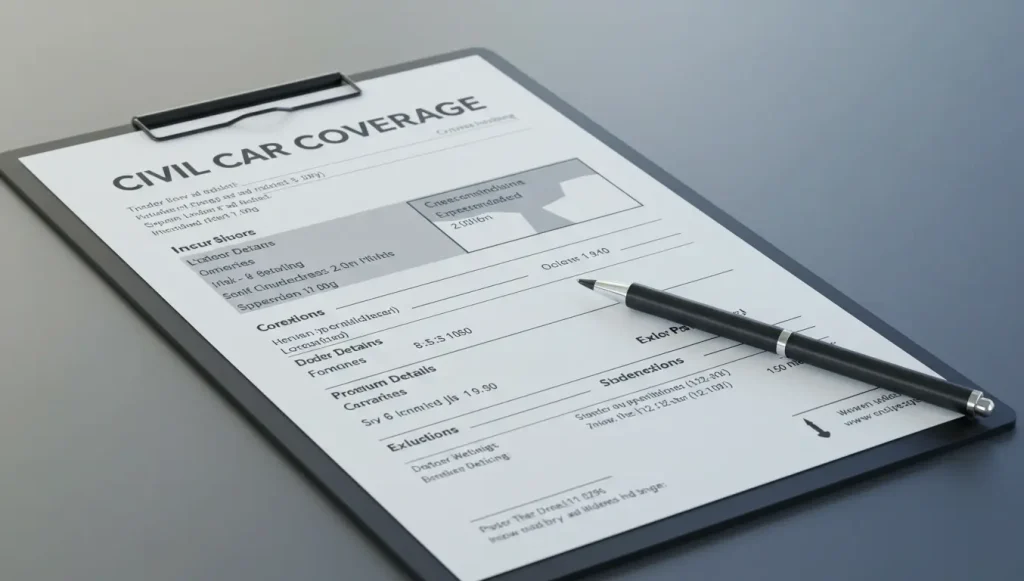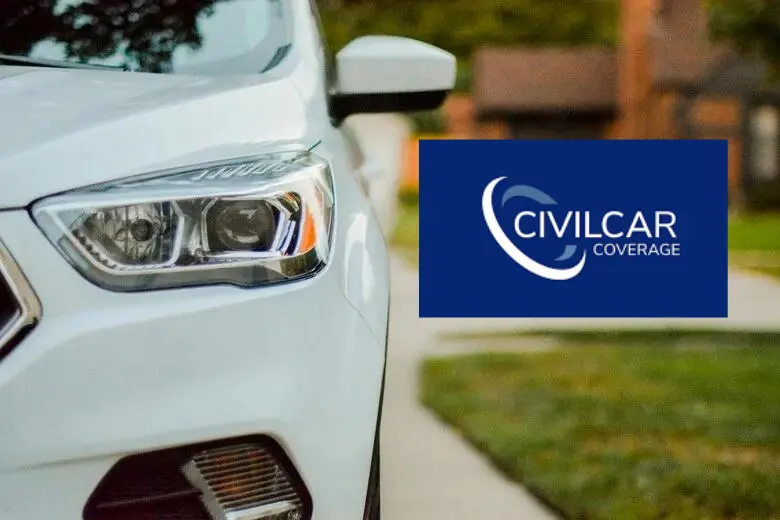Civil Car Coverage Review – Pros and Cons 2025
Driving can be a problem, with many rules and things to consider. Civil automobile coverage is a way to fix these problems. It covers everything from finding who is at fault in an accident to making sure you are safe if anything happens.
This blog will explain civil car coverage and why it’s important for your safety while driving.

What Is Civil Car Coverage?
Civil car coverage, also known as auto insurance, is a financial protection contract that helps cover the costs of accidents, damage, or other vehicle-related damages. It contains many forms of coverage, such as liability coverage, which pays for damage or injuries caused to others.
Civil car insurance can also cover medical expenses, uninsured motorists, etc. The terms of coverage can differ based on the insurance policy and provider. Civil auto insurance is important for safeguarding drivers and others on the road from financial losses and obligations.
Related Post: What is Karz Auto Insurance?
How Many Types of Civil Car Insurance Are There?
Civil vehicle insurance provides several options designed to meet drivers’ demands while protecting them from road dangers and liabilities. Here’s a more detailed overview of the primary categories of civil auto insurance coverage:

1) Liability Coverage
Most auto insurance policies include liability coverage which is needed in most states. It consists of two main components.
- It covers medical expenses, lost wages, and legal fees for others who are wounded or killed due to an accident for which you are held liable.
- It also covers property damage to others, such as vehicles, buildings, or structures, caused by you in an accident.
2) Collision Coverage
This form of coverage will pay for the repair or replacement of your car if it is damaged in a collision with another vehicle or object regardless of who is at fault. Collision coverage is usually tied to a deductible which is the amount you pay out of yourself before your insurance kicks in.
3) Comprehensive Coverage
Comprehensive coverage is also known as “other than collision” coverage. It covers your car from non-accident-related damage. This includes theft, vandalism, fire, natural calamities, and animal collisions.
4) Personal Injury Protection (PIP)
Personal Injury Protection, or Medical Payments Coverage, pays you and your passenger’s medical bills if you are injured in a collision. It can pay for medical fees, rehabilitation costs, lost wages, and burial expenses regardless of who was at fault.
5) Uninsured/Underinsured Motorist Coverage
This coverage applies if you are involved in an accident with a motorist who is either uninsured or does not have enough insurance to cover your losses. It can assist cover medical bills, lost wages, and property damage.
Also Read: What Makes Certainly Insurance Different?
Pros & Cons of Civil Car Coverage
We researched to find the most accurate pros and cons of getting civil car coverage.

Pros
1) Financial Protection
Civil car coverage protects against expenses caused by accidents, theft, vandalism, or natural disasters. It can help reduce the financial strain of repairing or replacing your vehicle and paying for medical bills.
2) Legal Requirement
Civil car insurance is required by law in several areas. Meeting this requirement guarantees that you follow the law and avoid potential penalties or legal consequences for driving without insurance.
3) Peace of Mind
Knowing you have insurance coverage can give you peace of mind while driving. You’ll feel more secure knowing you’re financially insured in the event of an accident or other covered incident.
Cons
1) Cost
Civil automobile insurance can be expensive, especially if you choose comprehensive coverage or have a history of accidents or traffic offenses. Balancing the insurance cost with the degree of coverage you require can be difficult for some people.
2) Deductibles and Co-Payments
Most insurance policies require you to pay a deductible or co-payment before the coverage begins. Depending on the amount of your deductible, this out-of-pocket fee might be costly especially if you need to file a claim.
3) Policy Exclusions and Restrictions
Insurance policies usually include exclusions and restrictions that can limit coverage in certain circumstances. It is important to carefully analyze your policy to understand what is and is not covered.
Related Post: What Is Otto Car Insurance?
What Do Civil Car Coverage Reviews Say About It?
Many people are concerned about the civil auto coverage reviews. Reviews on the company’s Facebook page are divided. While some express worries about the legitimacy of favorable ratings, others warn about the company’s practice of gathering and selling customer information.
Some argue that civil car coverage insurance is more suitable for modern vehicle types than older ones. Similarly, some warn about falling victim to scammers who use personal information for self-promotion.
FAQs
What does civil car coverage include, and how does it work?
Civil car coverage primarily protects you against financial liabilities if you are responsible for an accident that causes injury or damage to another person or their property. It typically includes Bodily Injury Liability (BIL) and Property Damage Liability (PDL). The bodily injury portion covers medical expenses, legal fees, and compensation for lost wages for the injured party. Property damage liability, on the other hand, helps pay for repairs or replacements of damaged vehicles, buildings, or other properties. While this coverage ensures compliance with legal requirements, it does not cover damages to your own car. Additional protection like collision or comprehensive coverage is required for personal vehicle repairs.
Is civil car coverage mandatory in all states or countries?
The requirement for civil car coverage varies by location. In most regions, having at least a minimum level of liability coverage is a legal requirement to operate a vehicle. Failure to carry the necessary coverage can result in severe penalties, including fines, license suspension, or even vehicle impoundment. Some states or countries may have different minimum coverage limits, so it is essential to check local regulations before purchasing a policy. Additionally, some areas mandate uninsured or underinsured motorist coverage to protect drivers against accidents involving those without sufficient insurance.
Can civil car coverage help in hit and run accidents?
In the case of a hit-and-run, standard civil car coverage does not usually provide direct financial protection. However, if you have uninsured motorist coverage, it may cover injuries and damages caused by an unidentified driver. Personal Injury Protection (PIP) or Medical Payments (MedPay) can also help with medical expenses, regardless of fault. If the driver responsible for the hit-and-run is identified, your liability coverage does not apply, but their insurance should cover your losses. Since hit-and-run accidents can be financially devastating, it’s wise to explore additional coverage options to stay fully protected.
How does filing a claim for civil car coverage impact my premium?
Filing a liability claim can result in an increase in your car insurance premium, as insurers view claims as a sign of higher risk. The impact on your rates depends on several factors, including the severity of the accident, your driving history, and your insurance provider’s policies. If the claim is minor, some companies may offer accident forgiveness programs that prevent an increase in premiums. However, multiple claims within a short period can lead to higher rates or even policy non-renewal. It’s important to evaluate whether it’s worth filing a claim for minor damages, as paying out of pocket might help keep your premiums lower in the long run.
What are the common exclusions in civil car coverage?
While civil car coverage provides essential protection, it does not cover every situation. One of the most significant exclusions is damage to your own vehicle, which requires collision or comprehensive coverage. Additionally, civil car coverage does not pay for intentional damage, illegal activities, or personal belongings inside the vehicle at the time of an accident. If you use your car for commercial purposes, such as ridesharing or delivery services, standard civil car coverage may not apply, and you may need specialized business auto insurance. Understanding these exclusions can help you determine if you need additional coverage options.
How can I lower my civil car coverage premium?
There are several ways to reduce your civil car coverage premium without compromising essential protection. One of the most effective methods is maintaining a clean driving record, as insurers reward safe drivers with lower rates. Opting for a higher deductible can also reduce monthly premiums, though this means paying more out of pocket in case of a claim. Bundling your car insurance with home or renters insurance can lead to multi-policy discounts. Additionally, enrolling in defensive driving courses or installing safety features in your vehicle may qualify you for further discounts. Shopping around and comparing multiple insurance providers can also help you find the most cost-effective policy.
Can I switch my civil car coverage provider at any time?
Yes, you can switch car insurance providers at any time, but it is crucial to check the terms of your current policy before canceling. Some insurers may charge cancellation fees, especially if you terminate the policy before its renewal date. To avoid coverage gaps, ensure your new policy is active before canceling the old one. Shopping for new insurance during renewal periods is often the best approach, as it allows for a seamless transition and may provide better deals. Comparing quotes, coverage options, and customer reviews can help you make an informed decision when switching providers.
Conclusion
Civil automobile coverage is important for drivers’ financial protection and peace of mind. It has several benefits, such as protecting against unforeseen expenses and meeting legal obligations.
However, it also has drawbacks and issues. New policyholders must take recommended steps before making informed judgments about civil automobile coverage.
Related Post: Coverage Professor Auto Insurance Guide






